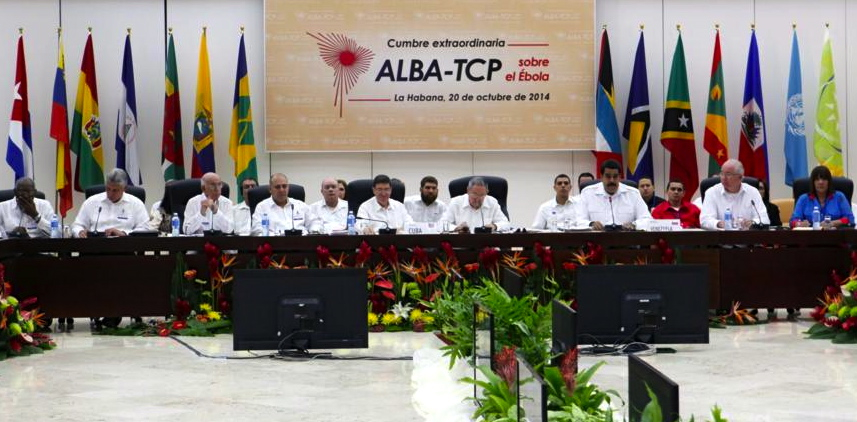
EspañolCuban President Raúl Castro hosted Bolivarian Alliance (ALBA) nations for an Ebola summit on Monday, to coordinate a multilateral effort to contain the disease and arrange for further aid to be sent to afflicted West African countries.
Castro contended that if the Ebola virus is not soon brought under control, it could quickly become one of the gravest pandemics in human history. He exhorted the need for a cohesive international response to the spreading disease, and he called on other nations, regardless of ideological persuasion, to join the effort.
“We must avoid any polarization of this great problem, or we risk losing track of the main objective, which is confronting this epidemic,” Castro said on Monday. “Cuba is willing to work side by side with all other countries, including the United States.”
Castro described the disease as a “public health emergency,” as designated by the World Health Organization, and called upon ALBA nations to quickly coordinate all material and human resources to diagnose and isolate potential Ebola cases.

Castro also took the opportunity during the Havana summit to announce his commitment to send 300 Cuban medical workers to Ebola-plagued countries in West Africa, scheduled to leave on Tuesday. The auxiliary medical personnel will be in addition to 156 medical workers sent to Sierra Leone in September.
Alongside Castro and international organizations such the UN Pan American Health Organization, the summit was attended by the presidents of Venezuela, Bolivia, Nicaragua, and Haiti (a non-ALBA guest). Senior officials also came from Saint Lucia, Saint Vincent, Grenada, Ecuador, Dominica, and Antigua and Barbuda.
All participating nations worked to establish a framework for a public-awareness campaign, increased Ebola research, and reinforced security at points of entry and departure. Participants also pledged their commitment to international information and research transparency in the spirit of like-minded collaboration, as outlined by the “Declaration of the Extraordinary ALBA-TCP Summit on Ebola” and published in the Cuban state newspaper Granma.
No Ebola cases have yet to be reported in Latin America or the Caribbean, but the virus is known to have reached both the United States and Spain. In the Western African countries of Liberia, Sierra Leone, and Guinea, the disease has claimed more than 4,500 victims since March, in the worst Ebola outbreak ever recorded.
Castro Brothers Offer Olive Branch?
In addition to Raúl’s open appeal to the United States for collaboration during Monday’s summit, former Cuban President Fidel Castro published an editorial entitled “Duty Calls” in Granma. He stated that Cuba “Will happily cooperate with US personnel in this task, not in search of peace between these two states which have been adversaries for so many years, but rather, in any event, for world peace, an objective which should be attempted.”
The 400-word article goes on to explain that Cuba and the “sister peoples” of Latin America and the Caribbean will be best protected from the cross-border spread of Ebola through cohesive and multilateral action taken to contain the virus.
Many Latin-American and Caribbean countries are poorly equipped to handle such an infectious disease, as evidenced by the Chikungunya outbreak in Nicaragua and Venezuela and the ongoing Dengue Fever epidemic in Honduras. Developing countries compound limited medical-care facilities and under-trained personnel with crowded living conditions, conducive to the spread of Ebola.
As National Secretary Orlando Gutierrez-Boronat of the Cuban Democratic Directory NGO put it, “regimes like Cuba and Venezuela with awful public health conditions are more susceptible to Ebola, whereas democratic countries like Costa Rica, Panama, or Colombia have good public health care and could better confront an Ebola outbreak.”
The Castro brothers have thus far framed Cuba’s commitment to fighting Ebola within largely humanitarian and public health terms. However, Gutierrez-Boronat asserts powerful political motivations as well.
“The Castro regime has committed to the Ebola Campaign with the political objective of breaking its international isolation and trying to get US economic sanctions lifted … Cuban doctors will work under highly unjust and difficult conditions [to do so].”
Although the Obama Administration has not yet issued an official response to the Castros’ olive branch, US Secretary of State John Kerry applauded Cuba’s effort to combat the disease on Friday, acknowledging the “courage of any health-care worker who is undertaking this challenge.”
Cuba’s leadership on this issue has likewise stirred public debate in the United States. The New York Times editorial board recently published an article that praised Cuba’s commitment to fighting Ebola and calling for an end to the US trade embargo, only to be quickly countered by the Washington Post editorial board.
Edited by Fergus Hodgson.
 Versión Español
Versión Español












